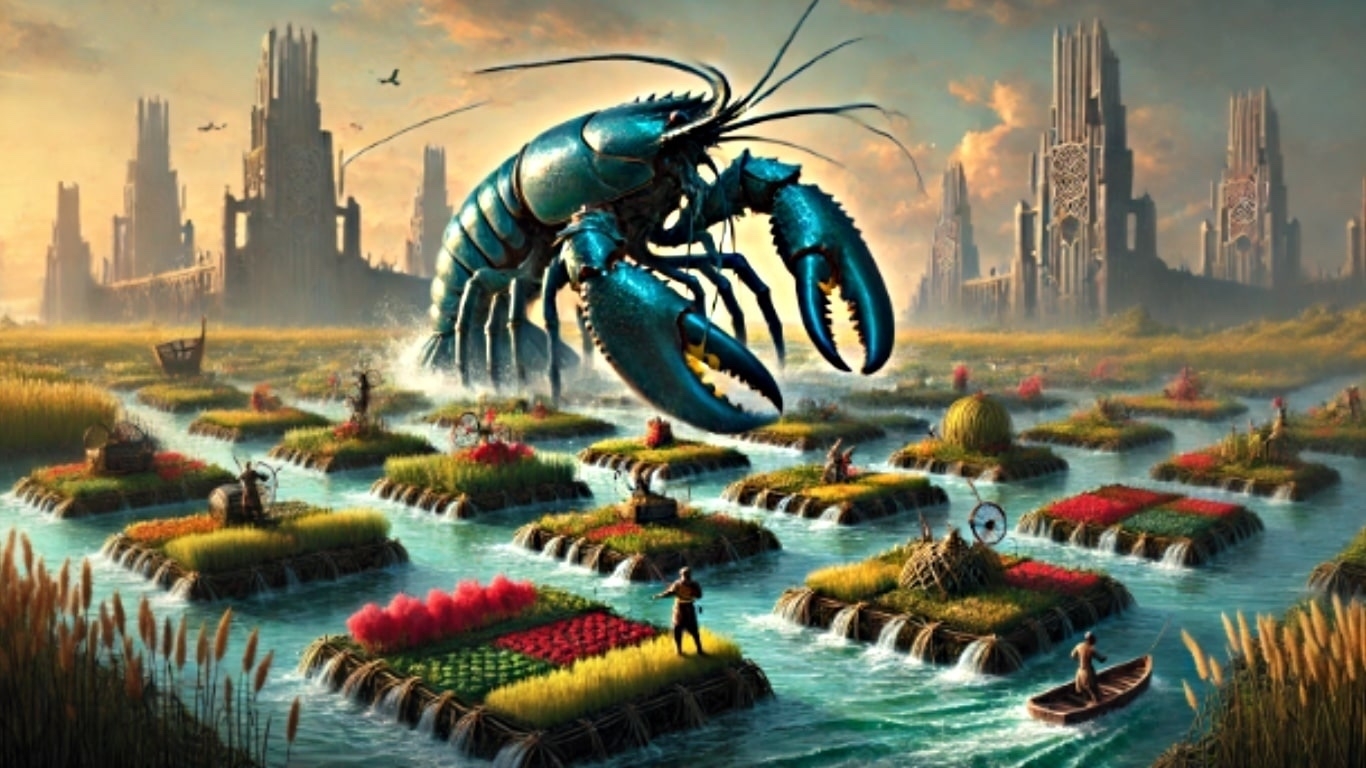Flayed Sun: To Heal the Sky

Chapter Two: The Gates of Tenoch
In our previous chapter, under the Flickering Sun, famine loomed, and a Farmlord tasked four adventurers—Cacalotl, a shadowy fugitive; Popochitl, a golem with heretical memories; Tlacotin, a cunning Huhuahua; and Xochi, a shifting scribe—to uncover the fate of the Forsaken One. In a village, they bartered, stole, and gathered supplies before facing Rabbit Gods in the marsh, offering blue corn for safe passage.
The marshland stretched out in bleak monotony, the air dense with rot and the whispers of unseen things. The adventurers pressed on, their boots sinking into the muck, until at last, the floating gardens of Tenoch rose before them. Once the Empire’s pride, the gardens now sprawled in wild decay. Flowers bloomed among ruins, and fruit-laden trees bent over waters shimmering with life and sickness. In their midst loomed a massive blue lobster, a beast hauled across the seas as a tribute and now driven mad by captivity. It thrashed against the Empire’s golems, its mournful cries rising above the cacophony of snapping branches and splintering wood.
The golems, painted with the imperial blue and marked by yellow stripes, moved with mechanical precision. They struck at the lobster with slings and weighted nets, their attempts to subdue it met with fury. The adventurers stood at a distance, weighing their options. Popochitl, the golem in their ranks, scanned the chaos, but wisdom failed it, and Tlacotin, ever brash, suggested he be thrown atop the creature to wrestle its reins. The suggestion hung in the air, absurd and earnest in equal measure.
A boat, barely tethered to the shore, became their plan. Popochitl, adopting the role of their master, led the group with convincing authority. They crossed the water’s surface, slipping through the gardens while the golems battled the beast. Their ruse held until their boat struck a golem’s craft, jarring them into the heart of the fray.
Popochitl, quick with words and using sub-vocal commands, persuaded the golems to halt their assault, promising to placate the lobster. The golems relented, their stiff forms retreating, and the adventurers stepped forward. Cacalotl knelt at the water’s edge, offering dried beans and an ear of sacred blue corn, his movements slow and deliberate. The great lobster regarded him, its massive claws twitching, before accepting the gift, leaving Cacalotl with its sweet mucous, which he gathered in a satchel. It sank into the waters with a low, resonant hum, its departure leaving ripples that spread wide. The golems, relieved, ushered the group through the gates of Tenoch.
The gates closed behind them, their carved surfaces worn by time, stories of forgotten eras fading into obscurity. Priests in elaborate robes argued overhead, their voices blending with the grinding of stone. Amid the crowd, a wiry man with sharp eyes waved them forward. He introduced himself as Talal, an acquaintance of the Farmlord, and invited them to his dwelling.
Talal led them through the city, his chatter a stream of history and trivia about Fletcher-Sender golems. The streets of Tenoch buzzed with life, the city’s splendor unmarred by the chaos outside its gates. His stories, blending grandeur with odd banality, lulled the group into a strange stupor. When they arrived at his apartment, it contrasted the city’s vibrance: plain, nondescript, with scrolls piled in the corners and little sign of personal touch.
Inside, Talal offered refreshments and settled into a more focused tale. The Forsaken One, once a Praxarch of the Empire, had been the finest operator of the weather machine, her skill unmatched. Envy and intrigue led to her downfall, and she was cast as a concubine for the emperor, her genius dismissed. But she escaped to the royal gardens, where she lingered still, having somehow defied time’s decay.
Talal unrolled a map, his finger tracing paths through the gardens. “The concubines,” he said, “are no longer what they were. They’ve become hags, twisted by madness and despair, their children forming feral gangs. The Forsaken One is among them, her presence distinct. She emits an aroma, and her form, cloaked in a tattered robe, is unmistakable. But be warned—she ensnares those who venture too close.”
He described the gardens as a battleground of creatures and chaos. The concubines, territorial and vengeful, prowled its depths. The adventurers asked how finding the Forsaken One would resolve the famine. Talal explained, “She holds the formula for optimal weather patterns. The priests’ failures have disrupted the machine, and only her knowledge can restore balance. Without it, the sun will flicker until the land is barren.”
The group hesitated, uneasy about aiding the Empire. “Wouldn’t this strengthen their hold on the people?” Cacalotl asked.
“Perhaps,” Talal admitted. “But without her, the famine will only worsen. The system must function, or we all perish.”
He showed them sketches of the concubines, their bodies contorted, moving in ways that defied nature. Their haggard forms exuded menace, their presence a promise of violence. The adventurers shuddered, their resolve tested by the grim task ahead.
Talal lent them tools for their journey: a bow and a dozen arrows for Popochitl, a blowgun for Tlacotin, and a bone shirt for Cacalotl. He also gifted them a pot containing fabric from the first sun, its black surface capable of freezing water on contact. “And keep the lobster’s mucus,” he advised. “Its value is greater than you realize.”
The group, wary but determined, prepared to rest. The path before them led to dread and danger, but the weight of the land’s survival left no room for hesitation. In the gardens, the Forsaken One awaited.